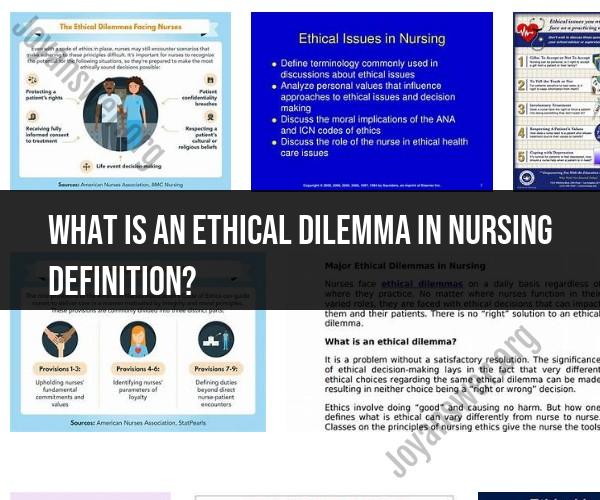What is an ethical dilemma in nursing definition?
An ethical dilemma in nursing is a complex situation in which a nurse faces conflicting moral principles or values and must make a difficult decision about the appropriate course of action. In these situations, there is often no clear "right" or "wrong" choice, and the nurse must navigate a delicate balance between competing ethical considerations. Ethical dilemmas in nursing can arise in various healthcare settings and involve a wide range of moral and ethical issues.
Key elements of an ethical dilemma in nursing include:
Conflict of Values: An ethical dilemma occurs when a nurse is torn between two or more conflicting values or principles. These conflicting values may involve patient autonomy, beneficence (doing good), non-maleficence (avoiding harm), justice, truth-telling, and professional integrity.
Complexity: Ethical dilemmas in nursing are often intricate and multifaceted. They may involve competing interests, uncertainties, and potential risks.
No Clear Solution: In many cases, there is no straightforward or universally accepted solution to the dilemma. Nurses may be faced with challenging decisions where any choice could have drawbacks or consequences.
Patient-Centered: Ethical dilemmas in nursing typically revolve around the well-being and rights of patients. Nurses must consider what is in the best interest of the patient while respecting their autonomy and values.
Examples of ethical dilemmas in nursing include:
Informed Consent: A patient with a life-threatening condition refuses a potentially life-saving treatment, and the nurse must decide whether to respect the patient's autonomy or intervene to save their life.
Confidentiality: A patient reveals information that could harm themselves or others, and the nurse must decide whether to breach confidentiality to prevent harm.
Resource Allocation: A nurse working in a resource-limited setting must decide how to allocate scarce medical resources (e.g., ventilators during a pandemic) among multiple patients with critical needs.
End-of-Life Care: A family requests that a nurse administers a higher dose of pain medication to a terminally ill patient to relieve suffering, but doing so may hasten the patient's death.
Whistleblowing: A nurse discovers unethical or unsafe practices within their healthcare organization and must decide whether to report the wrongdoing, potentially risking their own career and reputation.
Cultural and Religious Beliefs: A patient's cultural or religious beliefs conflict with recommended medical treatments, and the nurse must find a way to provide culturally sensitive care while respecting the patient's autonomy.
Duty to Warn: A patient discloses a history of violent behavior, and the nurse must decide whether to inform potential victims while maintaining patient confidentiality.
In these situations, ethical decision-making frameworks, such as the four principles of biomedical ethics (autonomy, beneficence, non-maleficence, and justice) and ethical guidelines provided by nursing associations, can assist nurses in deliberating and making ethically sound choices that prioritize patient well-being and uphold professional ethics. Ethical dilemmas in nursing require careful consideration, consultation with colleagues and ethics committees, and a commitment to ethical practice.












